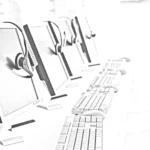This article was first published at ITK SECURITY
Last update 2 years ago by Ruppelt PatrickReading time: 14 minutes
Everyone is talking about the actions of the Friday for Future activists. This morning on B5 Aktuell I hear1)that all over the world activists are again taking to the streets to press their demands.2). Even in China, such demonstrations were allowed.
Meanwhile, our politicians are once again debating on a grand scale what climate protection should look like. They are hung up on the demands of one party, which the coalition partner does not want to support. And no one has really focused on it in recent years anyway. Deadlines are approaching, no result in sight3).
Energy efficiency and environmental protection: Without thinking about the economic factors, it is the duty of all of us to act in an ecologically sound way. If, on top of that, we can save energy resources and thus blatant costs, if we can get by with small air-conditioning units instead of large cooling units by choosing consolidated systems and save immense investment costs, then all the better. And that is exactly what we do and implement this basic idea for you.My website article from August 20114)
Because we established climate protection, sustainability and ecologically sound business practices as a central corporate guiding principle of our company back in 2011, I would like to take this opportunity today to give a brief presentation of what we are doing in this area.
I am fully aware that we will not save the world with this.
For me personally, however, it is also clear that we will not be able to achieve any global climate goals with the anti-European overall policy that the European population currently represents.
Let's take a look at the latest figures from the Federal Ministry for the Environment, Nature Conservation and Nuclear Safety for the past 30 years:
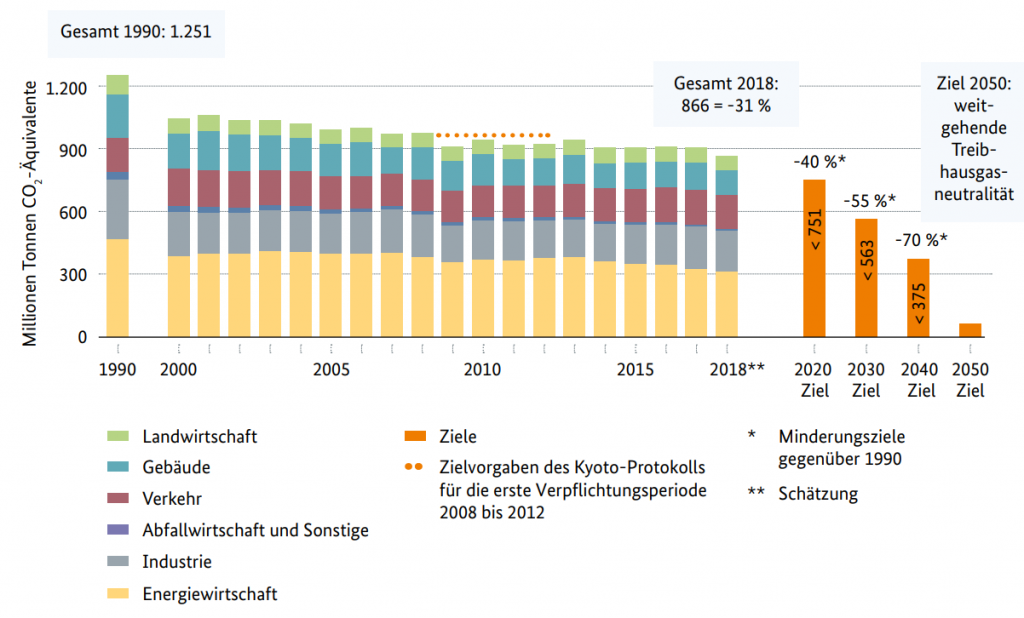
I will allow myself a simple interpolation of the course of exactly these 30 years to the announced year 2030, in which we want to phase out coal energy, as well as to the year 2050, in which, according to the federal government, we want to be as climate-neutral as possible. Mathematically, it looks like this:
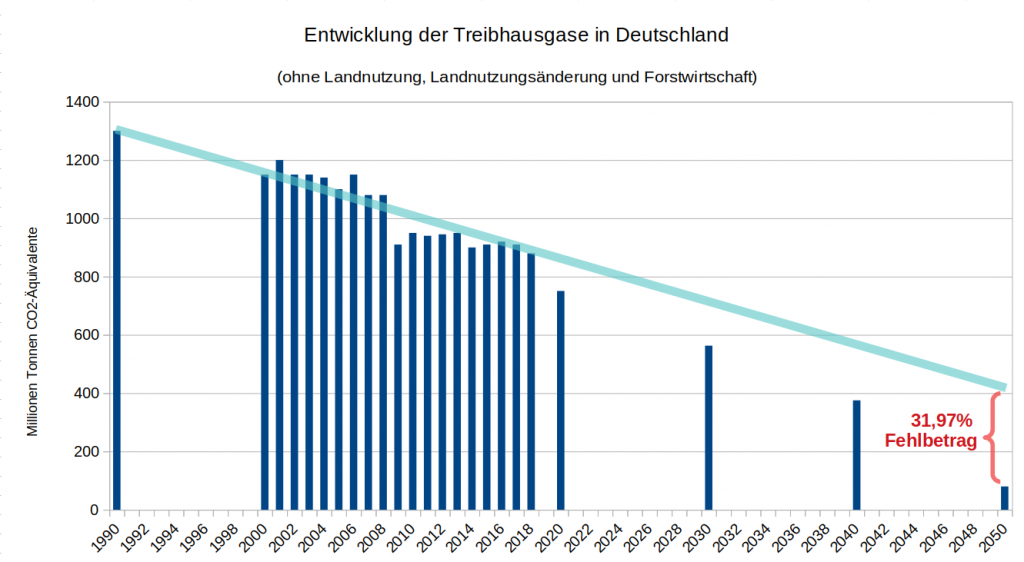
Mind you, these are not my figures, but those of the Federal Ministry.
If we continue as we have done in the past 20 years of so-called climate protection policy, the calculation cannot add up. With a shortfall of around 32%, i.e. missing the targets by 1/3, no higher mathematics is needed to realise this.
According to this calculation, the individual targets for 2020, 2030 and 2040 are also a long way off. To achieve this, much more far-reaching measures and global thinking and action are required.
If we extend the trend to zero, we will end up somewhere around 2080, maybe with a lot of luck around 2070, but we will certainly not achieve climate neutrality in 2050. And that is also a very euphemistic calculation, because we all know that in the first few years it is comparatively easy to turn the big screws and towards the end it will become increasingly difficult to implement the last ten or twenty percent.
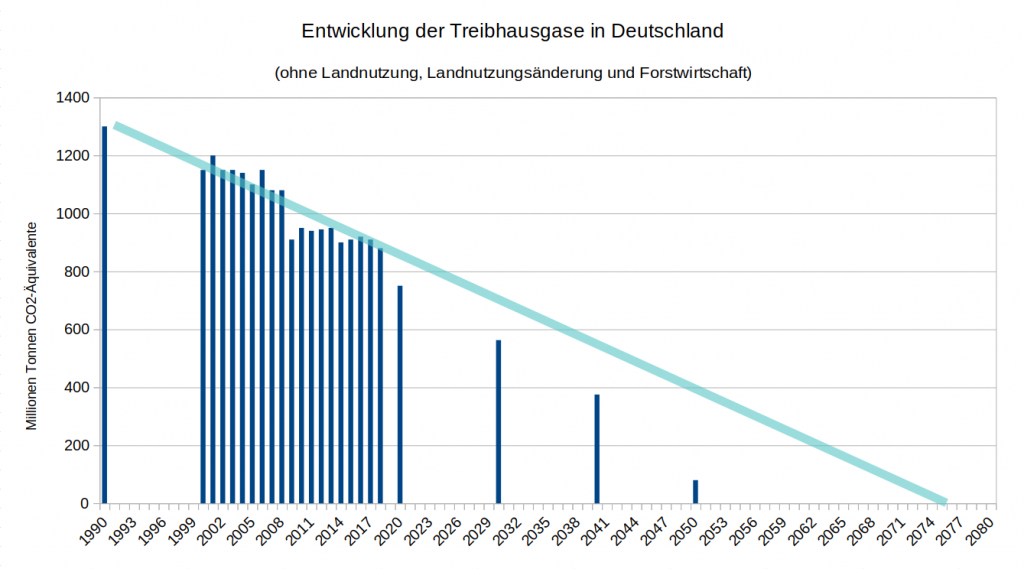
And yet we are of the opinion that one can and must take oneself by the nose to push this forward. If politics has failed for decades, you have to take action yourself. Nevertheless, I will take the liberty of saying that it is, after all, the policy we have voted for for decades and it took years before the Greens, for example, were finally allowed to experience rising voter numbers.
Closing one's eyes and going through the motions will not work here. It is therefore all the more important that each individual does as much as he or she can to protect the climate. To this end, I would like to present a few things that we have been doing for a long time to protect our environment.
Data centre with well cooling
Many hours and days went into choosing our new data centre service provider in 2011/2012. The focus for us was on a reliable partner who shares our attitude and operates a modern, tidy and energy-efficient data centre. We looked at pretty much everything from the Munich area, inspected the rooms personally. For weeks, we didn't find a single provider that met our expectations.
In conventional data centres, about half of the total energy expenditure is for the tonne. It disappears in air conditioning, dissipating waste heat, power loss and much more.
According to expert estimates, even in 2025 all German data centres will still be flushing well over half the energy down the toilet just like that6).
That was out of the question for us. How can you waste energy so thoughtlessly? There must be another way!
Yes, it does, and it goes like this:

Thanks to clever air-conditioning systems that manage without active air-conditioning systems and instead use Isar water to cool the data centre by means of two wells in the basement, our partner IGN has succeeded in reducing the so-called PuE value from the current 1.98) to 1.2. This means that the energy loss, if you want to call it that, is only 20%. Compared to the 90% still common in data centres today, this is a very significant saving.
M/eco-electricity
By 2025, our municipal utilities want to produce as much green electricity in their own plants as the whole of Munich needs.9). We want to be part of this and support it by relying exclusively on M/eco electricity both in the data centre and in the office (privately, too, by the way, because environmental protection does not stop at the office door. Actually, I am supplied by another energy source in my private flat, but I have exercised my right to choose out of conviction and have explicitly decided in favour of M/eco electricity in my private flat as well).
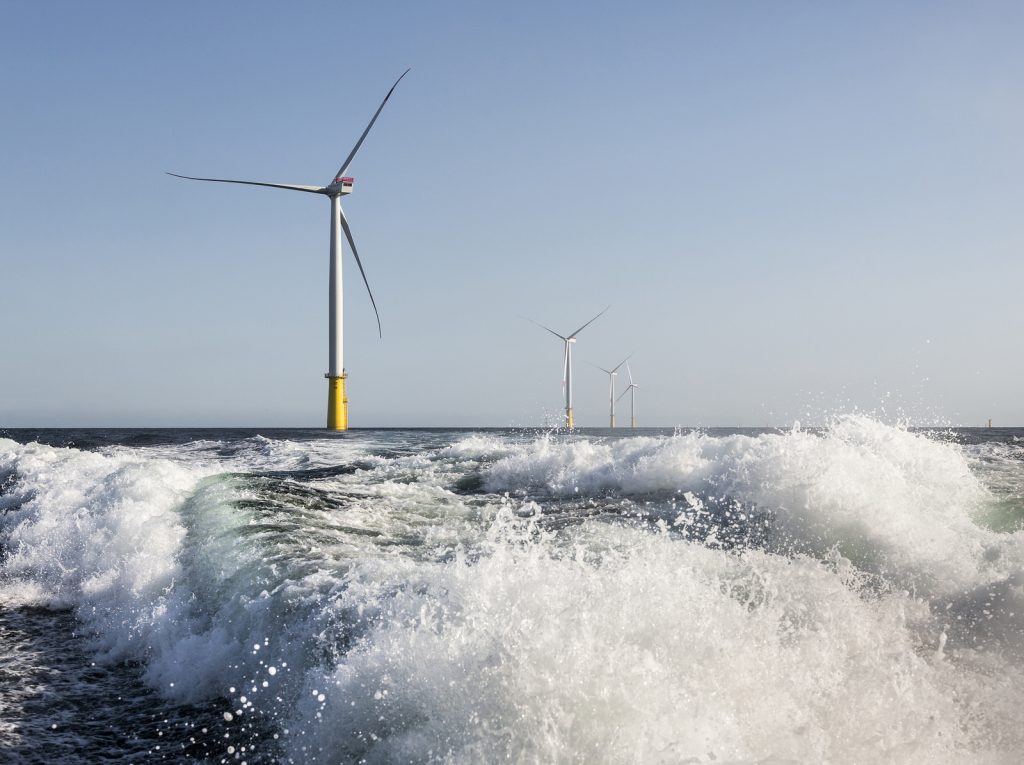
with kind permission of SWM for publication10)
Switchable circuits
Five years ago (2013) we reorganised all the lines in the office. In the process, the power distribution was completely re-planned and basically divided into two completely separate systems:
- Continuous power: server systems and high availability services
- Switchable office power: everything else
All equipment that is not absolutely necessary for maintaining the company's operations is completely disconnected from the grid outside business hours and whenever no one is present in the office. And there are a lot of them:
- Telephones
- Monitors
- PCs and notebooks
- Coffee maker, cooker, kitchen utensils
- Light
- Switching power supplies
- and so much more
Not only have we been able to drastically reduce our electricity costs, but we are also doing something good for the environment.
And then I read again:
Real climate protection will hurt
Source: Süddeutsche Zeitung from July 201911)
That is a very one-sided view. Environmental protection does not automatically go hand in hand with "it will hurt", as our politicians keep saying. I have lost count of how many times I have heard this phrase from government circles. In the end, environmental protection benefits everyone and even in the short term it may very well "not hurt" both for companies and for individuals.
Conserving raw materials: Used equipment
We have been equipping our office with second-hand equipment and furnishings for a long time. For office furniture, we discovered portals like ebay Kleinanzeigen a long time ago. All too often, we were able to organise great equipment from the immediate vicinity for little money - faster, cheaper and more resource-efficient than anything we could have bought new.
Through our full service concept, we have meanwhile built up a very large pool of rented IT equipment such as servers, network components, workstations and notebooks. These are all owned by us and are provided to the customer as full service rental equipment including all necessary licences and of course the services.
The units come back to us regularly:
- when the rental period expires and the customer gets a new device,
- if the customer has new hardware requirements and therefore switches to a different hardware ahead of time,
- if there is no longer a need for the computer due to personnel changes at the customer.
We obtain all rented equipment from the respective manufacturers with very long guarantees. For servers it is at least five years, for notebooks four years and for workstations also four or even three years, depending on the equipment and price of the devices.
But when they come back to us after two to three years, we have used, but very high quality devices here that, due to our special purchasing methods, usually even still have a remaining manufacturer's warranty.
We can offer these devices to our customers as second-hand computers for a reasonable price - or use them for ourselves.
In fact, most of the maintenance and test systems we operate come from this pool of equipment. The economical use of resources is not only good for the environment, but also for your wallet.
Food supply
If you work a lot, you also have to eat and drink. In the office, we make sure to buy only regional organic products as much as possible. Organic is certainly not a panacea; there's enough junk there, too. We don't need to talk about it.
But it's still better than a lot of what you get in various shops.
And yes, not all of us are vegetarians and three times less vegans. But we eat meat at work, well, I'd have to think about how often. Quite seldom, when I think about it (repeat: it's the same at home).
Paperless office
At the beginning of this year, we started to switch our office to paperless office. Admittedly, this was also due to the fact that we were tired of constantly buying new stamps because the post office was constantly increasing the postage.
As a result, however, we have now gone so far that practically no printed documents are sent by post at all. This saves considerable energy costs, paper production and environmental damage caused by the annoying transport by post. It is also faster and all customers who also work environmentally consciously paperless no longer even need to scan the documents. So it's a win-win-win for the environment, our business partners and us. Win-win-win, so to speak.
Fossil fuels
It's all rubbish what's out there and what's currently being done in politics. E-mobility is just as little the solution to our problems as the introduction of a CO2 tax (which I am very much in favour of, but this is not meant to be a political digression).
I can't believe that it's not technically feasible. Almost 20 years ago, we sent the Mars rover on a journey of almost 600 million kilometres.12) and politicians want to tell me that we are dependent on fossil fuels for urban mobility? So there you go, no one can seriously still take that at face value today.
We have two Bromtons13) as "company cars" in the office, use the MVV wherever possible, but the bottom line is that you're always travelling by car. Especially when, like me, you suddenly find yourself in a situation where you are 100% dependent on your car for health reasons, you always ask yourself what you could do differently.
Long story short: we don't have a solution for this. Because we don't want to leave it at that, we have decided to become an ARAL Card customer.14) decided to participate in the BP Target Neutral programme. Investing in carbon offset projects15) is not the solution either, but it is at least a start and better than nothing. And more than our federal government has done in the past 30 years.
Outlook
It's certainly not the end of the line yet. We are already making concrete plans for the next few months:
- Solar system to supply the office with solar power
- Electric pool vehicle for customer visits in the city
Let's see what else is to come. Do you have suggestions on what we can do even better? Then write to us, we are open to all suggestions.
We would also be happy to support your company in becoming more energy efficient. We can carry out professional measurements of energy consumption and optimise the electrical loads for you.
Thermographic measurements help to identify energy guzzlers and optimisation potential. We have all the equipment and expertise to support you in this.



